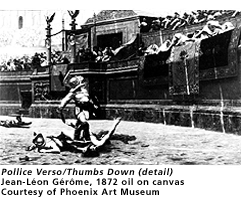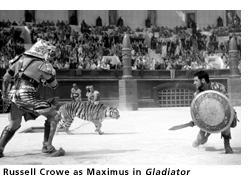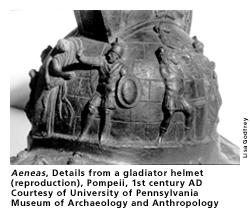



SMILING BACK AT DEATH
A Classicist Comments on Ridley Scott's Gladiator
"Rome is the light," broods General Maximus, the lead character in Gladiator, one of this summer's blockbuster movies. "The rest of the world is brutal and bloody and dark." Following that utterance, he spends the remainder of the film in the arena fighting for his life and learning just how wrong he is.
As a general, Maximus understood that building and maintaining an empire demands a lot of killing. The movie's opening scene shows him leading a well trained and well equipped army that dispatches with brutal efficiency those who would stand against the light. As a gladiator, though, he came to see that killing is not the real point of his new profession. "You must win the crowd," counsels Proximo, a successful gladiator turned trainer. Maximus learns the lesson well. Standing alone, sword raised in victory above the broken corpses sprawled at his feet, the gladiator taunts his bloodthirsty fans: "Are you not entertained? Is this why you are here?"
Classics professor Brent Shaw maintains that is exactly why they came. "Gladiatorial contests were a form of extreme entertainment," he says, comparing the fantastically costumed gladiators to customized race cars. Outfitted not in stripped-down military gear but with elaborately ornamented armor and weapons, gladiators dressed for spectacle.
Shaw is a historian of ancient Rome who specializes in the social and economic history of the empire at the height of its power. His main scholarly interest has been in how the people of North Africa became integrated into the imperial system, but he has also explored the Roman family and demographic cycles of marriage and death in the ancient Roman world.
A Canadian, he has fair skin and blue eyes that peer through wire-rimmed glasses, and he wears a brown corduroy jacket despite the heat. A tweed one with elbow patches hangs on a hook behind his office door, and a third jacket is spread over the arm of a chair. Strands of partly tamed hair bob up and down across his forehead as he speaks and nods suddenly to emphasize a point. "What we think happened," he explains, coming down with a nod on the think, "is something like this."
Gladiator Origins
Some scholars believe gladiatorial contests, munera gladiatoria, evolved out of religious rituals in pre- and early-Roman Italy. In the sixth and seventh centuries BC, slaves and prisoners were made to fight to the death at the funerals of prominent noblemen. The ceremony was a kind of living sacrifice in honor of the deceased. Just as the World Wrestling Federation's big commercial enterprise grew out of local amateur matches, Shaw surmises, so too did gladiatorial spectacles emerge from these funereal rites.
One of the more significant catalysts for the institution's development was the unprecedented wealth—one of the benefits of conquest—that began to pour into an area south of Rome called Campania. "That's where the entrepreneurs and business men lived," he says. "It became the Silicon Valley of their day. Fortunes were being made, and there developed a tremendous culture of luxury." As the empire expanded, people built fantastical villas and palatial houses, including some on platforms above the Bay of Naples and others on mountains whose peaks had been sheered off. Each tried to outdo the other in acquiring ever more ostentatious possessions and entertainment.
As ordinary amusements became boring, the ritual of funereal combat was somehow seized upon by the entrepreneurs of entertainment. "Little by little the [original] reason behind these gladiatorial games became lost," Shaw recounts. "At the end of the Roman Republic, when Julius Caesar puts on a huge gladiatorial contest, it's in honor of his dead father ostensibly, but his father had been dead for decades. It's just an excuse. . . . Really it just becomes big business."
The competitive politics of the Roman Republic also contributed to its development. In the second and third century BC, when the games were assuming the forms that posterity knows, those who aspired to political office were under pressure to spend huge sums on the staging of gladiatorial entertainment. "In many ways it was exactly as it is today with campaign financing: Hollywood and Washington were getting closer and closer. By the time you get to the first century BC, this is thoroughly entrenched not just in Campania but in the city of Rome itself."
Eventually munera spread to every part of the empire, and gladiatorial games became an integral and ubiquitous part of Roman life for almost 700 years. "They remain one of the most stereotypic, diagnostic things about being Roman that we have," Shaw asserts. So popular were the spectacles that they continued for a century and a half after the first Christian emperor, Constantine I, issued a decree in 325 AD abolishing them.
Thumbs Up and Thumbs Down
Shaw gives Gladiator a mixed review. "There were parts of the movie that really struck me as genuine and quite interesting. The opening battle scene, for instance, is rather striking: you sense that you are right on the battlefield itself. You actually feel, I think, some of the fear and chaos that Roman soldiers would have felt along the northern frontiers of the empire. But other parts of the film are difficult for me to appreciate as cinema because my mind is permanently poisoned with historical facts."
Maximus' fall into slavery and his sale to a gladiator school is a believable scenario, he says, as is the emperor Commodus' fascination with the arena, although the film's climax, when Maximus kills the emperor in the Colosseum, is not realistic. "No Roman emperor would have entered the arena and put his own life on the line like that. Being an emperor was dangerous enough." After several assassination attempts, the real Commodus was finally drugged by one of his concubines and strangled by a wrestler, but he did "fight" in the arena. According to Shaw, these contests were conducted with wooden swords, but the emperor didn't play fair, which as an autocrat was his prerogative. Commodus was a skilled fighter, and he kept a slave by his side to hand over a lethal blade in case he managed to subdue an opponent.
The film, in Shaw's view, is infected with romantic notions of American patriotism. "This idea that Roman senators were forever trying to reestablish the lost Roman Republic and the wonderful days of freedom is [based on] something that was long dead by this time." He also takes exception to how the film depicts the North African town where Maximus was bought and trained as an "outlandish, bizarre place: Roman planet Tatooine—something out of the film Star Wars where the hero is trained and honed so he can face the Darth Vader character." Real Roman towns and cities in the southern Mediterranean, he points out, looked more or less like all the other urban centers in the empire.
The Culture of the Arena
More than faithfulness to the details of historical veracity, Shaw is most
sensitive to what he keeps referring to as the "feel" of authenticity or
inauthenticity in Gladiator.
The film suggests that gladiators were simply thrown into the arena to hack away at each other when in fact they were highly skilled as fighters and as practitioners of stylized gladiatorial rituals. Shaw can't say exactly what artistic killing might have been like, but he notes, "like fencing, there are better and worse ways to fight. The crowd did not appreciate when somebody fought badly. I think the movie really lacked the culture of the arena."
Prospective combatants would "talk trash" to one another, letting fly with some prize insults, and the people who attended the games were deeply engaged just as sports fans today can call up the statistics of athletes' performance and the particulars of their personal lives. Betting was a big part of this world too. Individual gladiators were well known, as were their records in the arena. Roman citizens educated themselves in the fine points of gladiatorial combat and could recite the odds at play when a fighter wielding a net and trident faced another armed with sword and shield. Fans identified with their city's team of gladiators, who would sometimes fight those of a nearby town. In a game between the teams from Pompeii and Nuceria in 59 AD a riot, similar to a modern-day soccer melee, broke out. Nero closed down the amphitheater in Pompeii for ten years afterward.
"They weren't just watching these gladiators," Shaw insists. "Spectators were very much involved. What was creating the almost hysterical popularity and power of gladiators was this tremendous attachment of tens of thousands of fans. . . .  This was their star system, and the big gladiators were the stars of this world. They were more popular than emperors. Emperors would try to plug into this just as our politicians want to rub shoulders with [our stars]. It rubs off—you don't mind having photo ops with people like this. Roman emperors liked this as well and Commodus more than any other emperor."
This was their star system, and the big gladiators were the stars of this world. They were more popular than emperors. Emperors would try to plug into this just as our politicians want to rub shoulders with [our stars]. It rubs off—you don't mind having photo ops with people like this. Roman emperors liked this as well and Commodus more than any other emperor."
Although the opening battle scene captured for Shaw the "feel" of war, he remarks that a movie could not possibly impart an authentic experience of the arena. "They were really theaters of extreme cruelty. People don't die easily; they don't die nicely. I have heard people say that [the movie] is very violent, but it's like a Sunday picnic compared to the real thing."
In a sense, it's the limitation of film or of any reenactment. We can enjoy as entertainment a reenactment of a Civil War battle, for instance, because we know the soldiers aren't being killed. "I don't think the film at all can convey what it is actually like to sit down as a spectator who's paid for a ticket, as if you were going to a baseball game, and watch human beings kill each other—for entertainment—in front of you—live."

Despite the unpromising life expectancy of those who entered the arena, free born Romans sometimes became gladiators voluntarily, relinquishing their rights as citizens and giving over their bodies, in the words of the contract they signed, "to be burnt, to be chained up, to be beaten, and to be killed by an iron weapon." Gladiators who performed well were rewarded: slaves and prisoners could be set free and victorious fighters were often well remunerated. In the shadow of the empire's splendor and greatness, many Roman citizens endured a grinding poverty. Just as some third-world people sell their kidneys on the black market today, adds Shaw, in ancient Rome citizens with little hope sometimes rolled the dice in the arena.
"Death smiles on us all," mused the Gladiator. "All we can do is smile back.